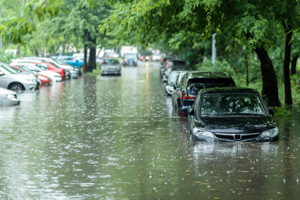 It is pouring rain, the wind is howling, and there has been an unexpected earthquake—and amidst all this chaos, your phone rings with a call to come into work. It sounds unreal, right? Yet, some employees face this exact scenario. So, can your employer legally expect you to work during such hazardous weather conditions? Fortunately, as of January 2023, under Senate Bill 1044, California employers may not take adverse action against any employee who refuses to work or leaves their workplace during an emergency when the employee has a reasonable belief that their workplace is unsafe. Notably, SB 1044 excludes a health pandemic as an emergency condition, so these protections will not apply under situations where an employee feels unsafe, for example, due to COVID-19.
It is pouring rain, the wind is howling, and there has been an unexpected earthquake—and amidst all this chaos, your phone rings with a call to come into work. It sounds unreal, right? Yet, some employees face this exact scenario. So, can your employer legally expect you to work during such hazardous weather conditions? Fortunately, as of January 2023, under Senate Bill 1044, California employers may not take adverse action against any employee who refuses to work or leaves their workplace during an emergency when the employee has a reasonable belief that their workplace is unsafe. Notably, SB 1044 excludes a health pandemic as an emergency condition, so these protections will not apply under situations where an employee feels unsafe, for example, due to COVID-19.
If your employer took adverse action against you or threatened retaliation against you for refusing to work or forced you to clock in during a natural disaster or emergency condition, speak with the leading employment lawyers at Blackstone Law for an assessment of your claim. You may be eligible to seek compensation for damages.
Your Legal Rights as an Employee During a Natural Disaster
Effective January 1, 2023, Senate Bill 1044 prohibits California employers from penalizing or threatening employees who choose not to show up or leave their jobs during emergencies if they reasonably believe the work environment is unsafe.
Employers must understand what defines an emergency condition or reasonable belief according to SB 1044:
- An emergency condition refers to situations where natural disasters or criminal acts pose grave risks to people or property in a workplace or when there is an evacuation order related to these events.
- A workplace being deemed unsafe means a sensible person, with the available information, would believe there is a serious risk of harm or death by entering or remaining on the premises.
The law takes into account an employer’s adherence to specific health and safety rules related to the emergency. This comes into play if:
- The employee is aware of this during the emergency.
- The employee has been trained on these specific regulations.
Furthermore, employers cannot prevent their staff from using their phones or other devices to:
- Call for help.
- Evaluate the safety.
- Check in with others, like family members.
Lastly, the law advises employees to inform their employers about emergency conditions when they are able to do so.
Employees Who Cannot Refuse to Work During a Natural Disaster
Senate Bill 1044 does not cover all employee categories. The following roles and professions are exempt from the protections of the law:
- First responders
- Disaster service workers
- Employees mandated by law to assist or stay onsite during emergencies
- Healthcare workers who directly care for patients or support patient care during crises
- Employees or contractors tied to state or city contracts for emergency services
- Those working on military bases or in the defense sector
- Workers handling nuclear reactors, materials, or waste
- Utility, communication, energy, or roadside assistance workers engaged in emergency responses
- Residential care facility staff
- Depository institution employees
- Transportation workers aiding emergency evacuations
- Employees of specific private fire prevention companies
- Workers whose main role is guiding public evacuations during emergencies
If you are not employed in one of the above sectors, you have the legal right to refuse to work during a natural disaster. Speak with the employment lawyers at Blackstone Law to understand your rights.
Speak With the Leading Employment Lawyers at Blackstone Law
Understanding your rights as an employee during emergencies can be complex. If you are unsure about where you stand or believe your rights have been violated by your employer, do not hesitate to seek legal guidance from the employment lawyers at Blackstone Law. We are prepared to help you seek compensation for damages if you were made to work during a natural disaster or emergency condition or have faced retaliation from your employer.
Schedule a complimentary consultation today with one of our dedicated employment lawyers at (310) 956-4054 or fill out a contact form.

